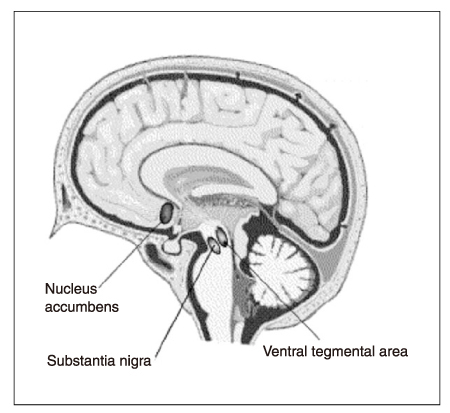J Korean Med Assoc.
2006 Mar;49(3):209-214.
Biological Model and Pharmacotherapy in Internet Addiction
- Affiliations
-
- 1Department of Neuropsychiatry, Chung-Ang University College of Medicine and Hospital, Korea. hawkeyelys@hanmail.net
Abstract
- Internet addiction, a kind of behavioral addiction, has recently emerged as a big social issue among Korean adolescents. However, medical researches on the internet addiction has just started. Through a review of the literature on drug addiction and pathologic gambling, which are thought to be similar to the internet addiction, the author summarized biological aspects of internet addiction and currently available medications for the addicts.
Keyword
MeSH Terms
Figure
Reference
-
1. Goldberg I. electronic message posted to research discussion list. Internet addiction. 1996. [available online at http://avocado.pc.helsinki.fi/~janne/ikg/].2. Young KS. Internet addiction : The emergence of a new clinical disorder. 1996. In : Paper presented at the 104th annual meeting of the American Psychological Association; Toronto, Canada.3. Cloninger CR, Dragan M, Svrakic DM, Przybeck TR. A psychobiological model of temperament and character. Arch Gen Psychiatry. 1993. 50:975–990.
Article4. Cloninger CR. Silk KR, editor. The genetics and psychobiology of the seven-factor model of personality. Biology of Personality Disorders. 1998. Washington DC: American Psychiatry Press;63–92.7. Comings DE, Blum K. Reward deficiency syndrome: genetic aspects of behavioral disorders. Prog Brain Res. 2000. 126:325–341.
Article8. Blum K, Sheridan PJ, Wood RC, Braverman ER, Chen TJ, Comings DE. Dopamine D2 receptor variants: association and linkage studies in impulsive-addictive-compulsive behavior. Pharmacogenetics. 1995. 5:121–141.
Article9. Sabol SZ, Nelson ML, Fisher C, Gunzerath L, Brody CL, Hu S. A genetic association for cigarrette smoking behavior. Health Psychol. 1999. 18:7–13.10. Muramatsu T, Higuchi S, Murayama M, Matsushita S, Hayashida M. Associstion between alcoholism and the dopamine D4 receptor gene. J Med Genet. 1996. 33:113–115.11. Ishikawa H, Ohtsuki T, Ishiguro H, Yamakawa-Kobayashi K, Endo K, Arinami T, et al. Association between serotonin transporter gene polymorphism and smoking among Japanese males. Cancer Epidemiol Biomarkers Prev. 1999. 8:831–833.12. Ashwin AP, Wade HB, Margret H, Charles CT, Edward G, Kevin H, et al. Serotonin transporter polymorphism and measures of impulsivity, aggression, and sensation-seeking among African-American cocaine-dependent individuals. Psychiatry Research. 2002. 110:103–115.
Article13. Vandenbergh DJ, Rodriguez LA, Miller IT, Uhi GR, Lachman HM. High-activity catechol-O-methyltransferase allele is more prevalent in polysubstance abuses. Am J Med Genet. 1997. 74:439–442.
Article14. Jerzy S, Jolanta KM, Ryszard K, Michael S, Hans R, Catrin W, et al. Norepinephrine transporter gene polymorphism is not associated with susceptibility to alcohol dependence. Psychiatry Res. 2002. 111:229–233.
Article15. DeCaria CM, Begaz T, Hollander E. Serotonergic and noradrenergic function in pathological gambling. CNS Spectr. 1998. 3:38–47.
Article16. Kim SW, Grant JE, Adson DE, Shin YC. Double-blind naltrexone and placebo comparison study in the treatment of pathological gambling. Biol Psychiatry. 2001. 49:914–921.
Article17. Hollander E, Begaz T, DeCaria CM. Pharmacological approaches in the treatment of pathological gambling. CNS Spectr. 1998. 9:72–80.18. Carrion VG. Naltrexone for the treatment of trichotillomania: a case report. J Clin Psychopharmacol. 1995. 15:444–445.
- Full Text Links
- Actions
-
Cited
- CITED
-
- Close
- Share
- Similar articles
-
- Educational Needs for Internet Addiction in Middle School Students of Korea
- Internet Addiction, Social Support and Psychological Factors in Adolescents
- Stress and Social Support According to Internet Addiction
- Factors Influencing Internet Addiction Tendency among Middle School Students in Gyeong-buk Area
- Internet Addiction, Self-esteem, and Loneliness in Adolescents


